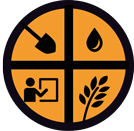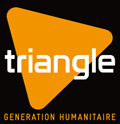- Funding : EuropeAid (European Commission)
During the first intervention in this second valley, TGH helped restore cultivated lands. Towards the end of 2009, thanks to funding from the European Commission and a partnership with the local organisation, Wadi Hadramout Development Project (WHADP), TGH launched a programme developing global agricultural production in Tareem valley. This both supported and accompanied reconstruction initiatives already launched by local actors. The programme’s objectives are described below.
- Restore access to agricultural land
Owing to the amount of uprooted date palms and the piles of rubble and stones borne by the flood, it was essential to start by clearing and levelling the land. Thus, before launching agricultural activities, the loaders and trucks from a private firm contracted by TGH, cleared, levelled and protected from erosion (protection of gabion banks) 732 hectares of land.
- Restore access to irrigation water
Traditional Hadramout irrigation structures (small dams, canals, deviations) are used in most of the region’s valleys. Through such systems, part of the wadi waters can be directed to agricultural lands that are not near rivers. Floods destroyed a major part of these infrastructures, preventing control or deviation of water towards agricultural areas. TGH worked with the WHADP engineers and villages involved to identify and size the infrastructures to rebuild or repair. Extensive works were carried out in over fifteen sites, allowing 1984 farming families to benefit anew from access to water and irrigating 2395 hectares.
- Improvement of production capacities
To improve the farming produce and raise production capacity, a variety of seeds selected specifically for the region will be distributed to the poorest families in Tareem and Sah valleys. 1132 families shall benefit from these distributions and cultivate approximately 1260 hectares.
- Improvement of natural resources management
Water resources, fairly rare in Yemen, are deteriorating. Some regions are already threatened in the medium term. Saving water and promoting good practices for water usage are consequently one of the primordial challenges for Yemen’s development, especially within the agricultural sector.
This is why TGH offers farmers in the region equipment and training dedicated to saving water for irrigation of lands devoid of canals. Such lands are irrigated via wells equipped with electric pumps. 240 farmers will be trained in “responsible irrigation techniques”. 15ha will be equipped with drop-to-drop systems, an experimental initiative.


